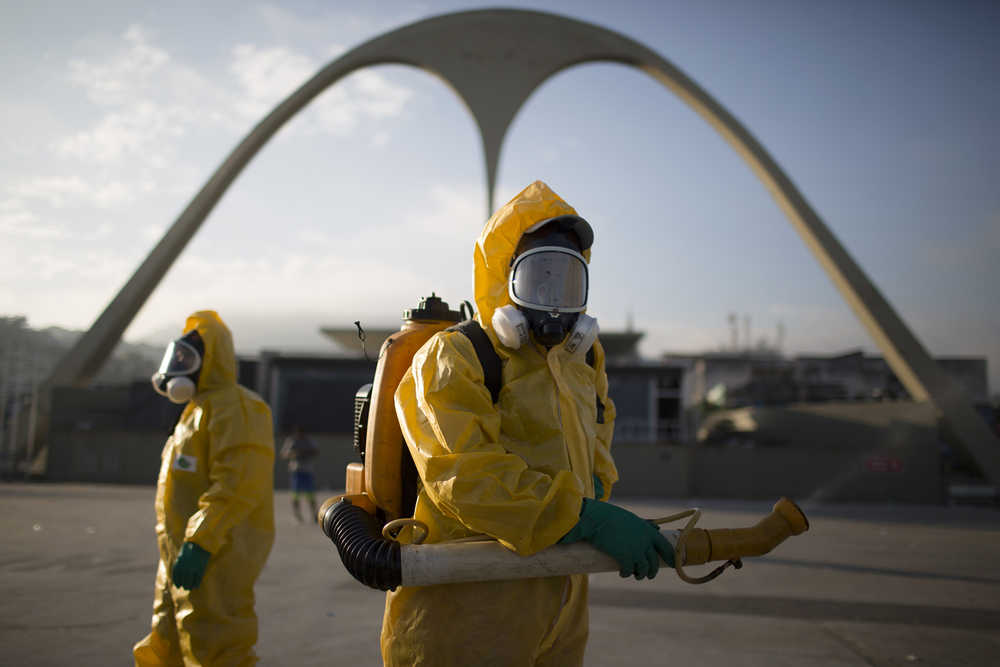RIO DE JANEIRO — Brazil’s health minister says the country is sending some 220,000 troops to battle the mosquito blamed for spreading a virus suspected of causing birth defects — but he also says the war is already being lost.
Marcelo Castro said that nearly 220,000 members of Brazil’s Armed Forces would go door-to-door to help in mosquito eradication efforts ahead of the country’s Carnival celebrations. Agency spokesman Nivaldo Coelho said Tuesday details of the deployment are still being worked out.
Castro also said the government would distribute mosquito repellent to some 400,000 pregnant women who receive cash-transfer benefits.
But the minister also said the country has failed in efforts against the Aedes aegypti mosquito that transmits Zika, dengue, chikungunya and yellow fever.
“The mosquito has been here in Brazil for three decades, and we are badly losing the battle against the mosquito,” the ministers told reporters as a crisis group on Zika was meeting in the capital, Brasilia.
A massive eradication effort eliminated Aedes aegypti from Brazil during the 1950s, but the mosquito slowly returned over the following decades from neighboring nations, public health experts have said. That led to outbreaks of dengue, which was recorded in record numbers last year.
The arrival of Zika in Brazil last year initially caused little alarm, as the virus’ symptoms are generally much milder than those of dengue. It didn’t become a crisis until late in the year, when researchers made the link with a dramatic increase in reported cases of microcephaly, a rare birth defect that sees babies born with unusually small heads and can cause lasting developmental problems.
The World Health Organization repeated Tuesday that the link remains circumstantial and is not yet proven scientifically.
But worry about the rapid spread of Zika has expanded across the nation, and the hemisphere beyond. The U.S. Centers for Disease Control and Prevention has advised pregnant women to reconsider travel to Brazil and 21 other countries and territories with Zika outbreaks.
One of them, the U.S. territory of Puerto Rico, reported 18 new confirmed cases of Zika on Tuesday, though none involve pregnant women. One case had been reported earlier.
Officials in El Salvador, Colombia and Brazil have suggested women stop getting pregnant until the crisis has passed.
Repellent has disappeared from many Brazilian pharmacies and prices for the product have tripled or even quadrupled where it’s still available in recent weeks since the government announced a suspected link between Zika virus and microcephaly
Nearly 4,000 suspected cases of microcephaly have been reported in Brazil since October, compared with fewer than 150 cases in the country in all of 2014.
Castro’s remarks have proven controversial, both in and outside Brazil.
World Health Organization spokesman Christian Lindmeier said he hadn’t seen the remarks, “but in general terms I think that this would be a bit of a fatalistic approach because this should mean we could lay down all our approaches now and declare the war lost.
“I don’t think this is the case,” he added at WHO headquarters, in Geneva.
In Brazil, some called for Castro to be fired.
“He is incapable of occupying his position,” wrote Helio Gurovitz, a columnist with G1, the internet portal of the Globo television network. “To prove that Castro doesn’t have the capacity to occupy such an important position, at such a delicate moment with the spread of the epidemic, all that’s needed is a selection of such comments.”
Both Brazil’s Zika outbreak and the spike in microcephaly have been concentrated in the poor and underdeveloped northeast of the country, though the prosperous southeast, where Sao Paulo and Rio de Janeiro are located, are the second hardest-hit region. Rio de Janeiro will host the Aug. 5-21 Olympic games.
On Tuesday, officials in Rio also ramped up their fight against the Aedes aegypti, dispatching a team of fumigators to the Sambadrome, where the city’s Carnival parades will take place next month, and the region’s governor was distributing mosquito-fighting vehicles for poor suburbs of the city.
Officials in another hard-hit South American country, Colombia, also ramped up efforts against Zika on Tuesday.
Health Minister Alejandro Gaviria visited the city of Ibague, a hotbed of Zika, to start a “Tour of Colombia” campaign to educate local officials on how to fight the mosquitoes. Colombian officials say they’ve recorded more than 13,500 suspected cases and President Juan Manuel Santos said there could be 600,000 cases by year’s end.
The WHO’s Lindmeier said Tuesday that the U.N. agency plans a special session on the virus during a Geneva meeting of its executive board on Thursday.
__
Associated Press reporters Jamey Keaten in Geneva and Cesar Garcia in Bogota, Colombia, contributed to this report.

